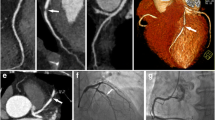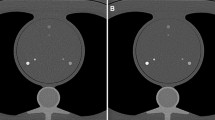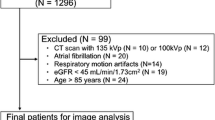Abstract
Background
We compared the interobserver variability concerning the detection of calcified and non-calcified plaque in two different low-dose and standard retrospectively gated protocols for coronary CTA.
Methods
150 patients with low heart rates and less than 100 kg body weight were randomised and examined by contrast-enhanced dual-source CT coronary angiography (100 kV, 320 mAs). 50 patients were examined with prospectively ECG-triggered axial acquisition, 50 patients with prospectively ECG-triggered high pitch spiral acquisition, and 50 patients using spiral acquisition with retrospective ECG gating. Two investigators independently analysed the datasets concerning the presence of calcified and non-calcified plaque on a per-segment level.
Results
Mean effective dose was 1.4 ± 0.2 mSv for axial, 0.8 ± 0.07 mSv for high-pitch spiral, and 5.3 ± 2.6 mSV for standard spiral acquisition (P < 0.0001). In axial acquisition, interobserver agreement concerning the presence of atherosclerotic plaque was achieved in 650/749 coronary segments (86.8%). In high-pitch spiral acquisition, agreement was achieved in 664/748 segments (88.8%, n.s.). In standard spiral acquisition, agreement was achieved in 672/738 segments (91.0%, P < 0.0001). Interobserver agreement was significantly higher for calcified than for non-calcified plaque in all data acquisition modes.
Conclusion
Low-dose coronary CT angiography permits the detection of coronary atherosclerotic plaque with good interobserver agreement.
Key Points
• Low-dose CT protocols permit coronary plaque detection with good interobserver agreement.
• Image noise is a major predictor of interobserver variability.
• Interobserver agreement is significantly higher for calcified than for non-calcified plaque.




Similar content being viewed by others
References
Taylor AJ, Cerqueira M, Hodgson JM, ACCF/SCCT/ACR/AHA/ASE/ASNC/NASCI/SCAI/SCMR et al (2010) Appropriate use criteria for cardiac computed tomography. A report of the American College of Cardiology Foundation Appropriate Use Criteria Task Force, the Society of Cardiovascular Computed Tomography, the American College of Radiology, the American Heart Association, the American Society of Echocardiography, the American Society of Nuclear Cardiology, the North American Society for Cardiovascular Imaging, the Society for Cardiovascular Angiography and Interventions, and the Society for Cardiovascular Magnetic Resonance. J Cardiovasc Comput Tomogr 4(407):e1–e33
Min JK, Shaw LJ, Devereux RB et al (2007) Prognostic value of multidetector coronary computed tomographic angiography for prediction of all-cause mortality. J Am Coll Cardiol 50:1161–1170
Achenbach S, Raggi P (2010) Imaging of coronary atherosclerosis by computed tomography. Eur Heart J 31:1442–1448
Chow BJ, Small G, Yam Y et al (2011) Incremental prognostic value of cardiac computed tomography in coronary artery disease using CONFIRM: COroNary computed tomography angiography evaluation for clinical outcomes: an InteRnational Multicenter registry. Circ Cardiovasc Imaging 4:463–472
Hadamitzky M, Freissmuth B, Meyer T et al (2009) Prognostic value of coronary computed tomographic angiography for prediction of cardiac events in patients with suspected coronary artery disease. JACC Cardiovasc Imaging 2:404–411
Min JK, Feignoux J, Treutenaere J, Laperche T, Sablayrolles J (2010) The prognostic value of multidetector coronary CT angiography for the prediction of major adverse cardiovascular events: a multicenter observational cohort study. Int J Cardiovasc Imaging 26:721–728
Russo V, Zavalloni A, Bacchi Reggiani ML et al (2010) Incremental prognostic value of coronary CT angiography in patients with suspected coronary artery disease. Circ Cardiovasc Imaging 3:351–359
Schlett CL, Banerji D, Siegel E et al (2011) Prognostic value of CT angiography for major adverse cardiac events in patients with acute chest pain from the emergency department: 2-year outcomes of the ROMICAT trial. JACC Cardiovasc Imaging 4:481–491
Einstein AJ, Knuuti J (2011) Cardiac imaging: does radiation matter? Eur Heart J. doi:10.1093/eurheartj/ehr281
Hausleiter J, Meyer T (2008) Tips to minimize radiation exposure. J Cardiovasc Comput Tomogr 2:325–327
Halliburton SS, Abbara S, Chen MY et al (2011) SCCT guidelines on radiation dose and dose-optimization strategies in cardiovascular CT. J Cardiovasc Comput Tomogr 5:198–224
Entrikin DW, Leipsic JA, Carr JJ (2011) Optimization of radiation dose reduction in cardiac computed tomographic angiography. Cardiol Rev 19:163–176
Hirai N, Horiguchi J, Fujioka C et al (2008) Prospective versus retrospective ECG-gated 64-detector coronary CT angiography: assessment of image quality, stenosis, and radiation dose. Radiology 248:424–430
Earls JP, Berman EL, Urban BA et al (2008) Prospectively gated transverse coronary CT angiography versus retrospectively gated helical technique: improved image quality and reduced radiation dose. Radiology 246:742–753
Shuman WP, Branch KR, May JM et al (2008) Prospective versus retrospective ECG gating for 64-detector CT of the coronary arteries: comparison of image quality and patient radiation dose. Radiology 248:431–437
Hausleiter J, Bischoff B, Hein F et al (2009) Feasibility of dual-source cardiac CT angiography with high-pitch scan protocols. J Cardiovasc Comput Tomogr 3:236–242
Achenbach S, Marwan M, Ropers D et al (2010) Coronary computed tomography angiography with a consistent dose below 1 mSv using prospectively electrocardiogram-triggered high-pitch spiral acquisition. Eur Heart J 31:340–346
Achenbach S, Marwan M, Schepis T et al (2009) High-pitch spiral acquisition: a new scan mode for coronary CT angiography. J Cardiovasc Comput Tomogr 3:117–121
Lell M, Hinkmann F, Anders K et al (2009) High-pitch electrocardiogram-triggered computed tomography of the chest: initial results. Invest Radiol 44:728–733
Achenbach S, Goroll T, Seltmann M et al (2011) Detection of coronary artery stenoses by low-dose, prospectively ECG-triggered, high-pitch spiral coronary CT angiography. JACC Cardiovasc Imaging 4:328–337
Feuchtner GM, Jodocy D, Klauser A et al (2010) Radiation dose reduction by using 100-kV tube voltage in cardiac 64-slice computed tomography: a comparative study. Eur J Radiol 75(1):e51–e56
Hausleiter J, Meyer T, Hadamitzky M et al (2006) Radiation dose estimates from cardiac multislice computed tomography in daily practice: impact of different scanning protocols on effective dose estimates. Circulation 113:1305–1310
Heyer CM, Mohr PS, Lemburg SP, Peters SA, Nicolas V (2007) Image quality and radiation exposure at pulmonary CT angiography with 100- or 120-kVp protocol: prospective randomized study. Radiology 245:577–583
Blankstein R, Bolen MA, Pale R et al (2011) Use of 100 kV versus 120 kV in cardiac dual source computed tomography: effect on radiation dose and image quality. Int J Cardiovasc Imaging 27:579–586
Raff GL, Abidov A, Achenbach S et al (2009) SCCT guidelines for the interpretation and reporting of coronary computed tomographic angiography. J Cardiovasc Comput Tomogr 3:122–136
Achenbach S, Moselewski F, Ropers D et al (2004) Detection of calcified and noncalcified coronary atherosclerotic plaque by contrast-enhanced, submillimeter multidetector spiral computed tomography: a segment-based comparison with intravascular ultrasound. Circulation 109:14–17
Bongartz G, Golding S, Jurik AG et al (2004) European guidelines for multislice computed tomography: Appendix C funded by the European Commission. Contract number FIGM-CT2000-20078-CT-TIP
Sim J, Wright CC (2005) The kappa statistic in reliability studies: use, interpretation, and sample size requirements. Phys Ther 85:257–268
Landis JR, Koch GG (1977) The measurement of observer agreement for categorical data. Biometrics 33:159–174
Ovrehus KA, Marwan M, Botker HE, Achenbach S, Norgaard BL (2011) Reproducibility of coronary plaque detection and characterization using low radiation dose coronary computed tomographic angiography in patients with intermediate likelihood of coronary artery disease (ReSCAN study). Int J Cardiovasc Imaging. doi:10.1007/s10554-011-9895-1
Hoffmann H, Frieler K, Hamm B, Dewey M (2008) Intra- and interobserver variability in detection and assessment of calcified and noncalcified coronary artery plaques using 64-slice computed tomography: variability in coronary plaque measurement using MSCT. Int J Cardiovasc Imaging 24:735–742
Ferencik M, Nieman K, Achenbach S (2006) Noncalcified and calcified coronary plaque detection by contrast-enhanced multi-detector computed tomography: a study of interobserver agreement. J Am Coll Cardiol 47:207–209
Ostrom MP, Gopal A, Ahmadi N et al (2008) Mortality incidence and the severity of coronary atherosclerosis assessed by computed tomography angiography. J Am Coll Cardiol 52:1335–1343
Motoyama S, Sarai M, Harigaya H et al (2009) Computed tomographic angiography characteristics of atherosclerotic plaques subsequently resulting in acute coronary syndrome. J Am Coll Cardiol 54:49–57
Kristensen TS, Kofoed KF, Kuhl JT, Nielsen WB, Nielsen MB, Kelbaek H (2011) Prognostic implications of nonobstructive coronary plaques in patients with non-ST-segment elevation myocardial infarction: a multidetector computed tomography study. J Am Coll Cardiol 58:502–509
Aggarwal NR, Knickelbine T, Tande A, Stoltzfus L, Lesser JR, Schwartz RS (2011) Noncalcified plaque: relationship between results of multi slice computed tomography, risk factors and late clinical outcome. Catheter Cardiovasc Interv 78:1116–1124
van Velzen JE, de Graaf FR, Kroft LJ et al (2011) Performance and efficacy of 320-row computed tomography coronary angiography in patients presenting with acute chest pain: results from a clinical registry. Int J Cardiovasc Imaging. doi:10.1007/s10554-011-9889-z
Voros S, Rinehart S, Qian Z et al (2011) Coronary atherosclerosis imaging by coronary CT angiography: current status, correlation with intravascular interrogation and meta-analysis. JACC Cardiovasc Imaging 4:537–548
Springer I, Dewey M (2009) Comparison of multislice computed tomography with intravascular ultrasound for detection and characterization of coronary artery plaques: a systematic review. Eur J Radiol 71:275–282
van der Giessen AG, Toepker MH, Donelly PM et al (2010) Reproducibility, accuracy, and predictors of accuracy for the detection of coronary atherosclerotic plaque composition by computed tomography: an ex vivo comparison to intravascular ultrasound. Invest Radiol 45:693–701
Kim SY, Kim KS, Lee YS et al (2009) Assessment of non-calcified coronary plaques using 64-slice computed tomography: comparison with intravascular ultrasound. Kor Circ J 39:95–99
Saur SC, Alkadhi H, Stolzmann P et al (2010) Effect of reader experience on variability, evaluation time and accuracy of coronary plaque detection with computed tomography coronary angiography. Eur Radiol 20:1599–1606
Ovrehus KA, Munkholm H, Bøttcher M, Bøtker HE, Nørgaard BL (2010) Coronary computed tomographic angiography in patients suspected of coronary artery disease: impact of observer experience on diagnostic performance and interobserver reproducibility. J Cardiovasc Comput Tomogr 4:186–194
Acknowledgement
This study was supported by the German Government, Bundesministerium für Bildung und Forschung (01EX1012B, “Spitzencluster Medical Valley”).
Author information
Authors and Affiliations
Corresponding author
Rights and permissions
About this article
Cite this article
Schuhbäck, A., Marwan, M., Gauss, S. et al. Interobserver agreement for the detection of atherosclerotic plaque in coronary CT angiography: comparison of two low-dose image acquisition protocols with standard retrospectively ECG-gated reconstruction. Eur Radiol 22, 1529–1536 (2012). https://doi.org/10.1007/s00330-012-2389-2
Received:
Revised:
Accepted:
Published:
Issue Date:
DOI: https://doi.org/10.1007/s00330-012-2389-2




